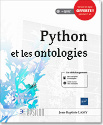éClaircie 0.3
éClaircie is the static, cloud-less and anti-tracing blog engine used by the Flower of Evidence. This third version éClaircie remove the dependence to Sphinx which caused many problems due to the many incompatible changes and the poor multilingual search support in Sphinx.
You can download the new version here: Download at PyPI.
Owlready2 0.13 has been released!
Owlready is a Python module for ontology-oriented programming. It can load OWL 2.0 ontologies and manipulate them transparently in Python.
This new version fixes several bugs and performance regressions related to the new quadstore introduced in the previous release.
Here are the changes in version 0.13:
Bugfixes: - Fix performance regression due to suboptimal index in the quadstore - Fix messing up with IRI ending with a / - Fix error in World cloning - Fix the addition of Thing in class's parent when redefining a class with Thing as the only parent - Fix inverse_resctriction() - Add error message when creating an existent quadstore
The new version be downloaded from PyPI (Python Package Index): https://pypi.python.org/pypi/Owlready2
Owlready2 0.12 has been released!
Owlready is a Python module for ontology-oriented programming. It can load OWL 2.0 ontologies and manipulate them transparently in Python.
This new major version uses a new quadstore, with better performances, and has been tested up to 200 millions of RDF triplets (can load DBpedia!). PostgresQL support has been dropped because its interest was very limited (performances were poor compared to Sqlite3).
Here are the changes in version 0.12:
New quadstore
Numerical search (NumS, e.g. all patients with age > 65)
Nested searches
Synchronization for multithreading support
Add Class.inverse_restrictions() and Class.direct_instances()
Drop PostgresQL support (little interest: more complex and slower than Sqlite3)
Bugfixes: - Fix call to _get_by_storid2 - Fix rdfs_subclassof in doc - Fix FTS triggers - Fix boolean in RDFlib / SPARQL - Fix bug when destroying an AnnotationProperty
The new version be downloaded from PyPI (Python Package Index): https://pypi.python.org/pypi/Owlready2
Owlready2 0.11 has been released!
Owlready is a Python module for ontology-oriented programming. It can load OWL 2.0 ontologies and manipulate them transparently in Python.
This new version brings two major new features: the support for Pellet reasoner and the optimized full-text search.
Here are the changes in version 0.11:
Optimized Full-Text Search
Support Pellet reasoner in addition to HermiT
Support loading of huge OWL files (incremental load)
Use Class.property.indirect() for indirect Class property (instead of Class.property)
Add reload and reload_if_newer parameters to Ontology.load()
search() is now much faster on properties that have inverse
Add shortcut for SOME ConstrainedDatatype: e.g. age >= 65
Bugfixes: - Fix creation of an individual that already exists in the quadstore - Fix missing import of EntityClass in class_construct.py - Fix World.save() with RDF/XML format - Fix Thing.subclasses() and Thing.descendants() - Fix ontology's update time for ontologies created de novo in Python with Owlready - Fix reasoning when asserting new parents with equivalent classes
The new version be downloaded from PyPI (Python Package Index): https://pypi.python.org/pypi/Owlready2
Owlready2 0.10 has been released!
Owlready is a Python module for ontology-oriented programming. It can load OWL 2.0 ontologies and manipulate them transparently in Python.
This new version fixes many bugs and adds the support of ontology metadata. It also introduces the use of Cython, for improving performances when reading RDF/XML and OWL/XML files. Owlready2 is now able to read these files as fast as Java !
Here are the changes in version 0.10:
Add Ontology.metadata for adding/querying ontology metadata
Allows multiple individual creations with the same name/IRI, now returning the same individuals
Add OwlReadyInconsistentOntologyError and Word.inconsistent_classes()
Implement RDF/XML and OWL/XML parsing in Cython (25% speed boost for parsing)
Small optimization
Extend individual.prop.indirect() to include relations asserted at the class level
Add .query_owlready() method to RDF graph
Bugfixes: - Fix reasoning when obtaining classes equivalent to nothing - Fix World creation with backend parameters - Fix error when adding property at the class definition level - Fix loading of ontology files with no extension from onto_path - Fix properties defined with type 'RDF Property' and subproperty of 'OWL Data/Object/Annotation Property' - Support old SQLite3 versions that do not accept WITHOUT ROWID - Fix reference to undeclared entities (they were replaced by None, now by their IRI) - Fix loading and saving ontologies whose base IRI ends with / - Fix RDF query using string
The new version be downloaded from PyPI (Python Package Index): https://pypi.python.org/pypi/Owlready2
Cerealizer 0.8.2
Cerealizer 0.8.2 is out!
This is a new bugfix release for pip. Get it here: https://pypi.org/project/Cerealizer/
Owlready2 0.9 has been released!
Owlready is a Python module for ontology-oriented programming. It can load OWL 2.0 ontologies and manipulate them transparently in Python.
This new version allows the use of PostgresQL instead of SQLite3 (however, performances are usually lower). It also facilitate the access to SOME restrictions on classes, using the dotted notation "class.property".
Here are the changes in version 0.9:
PostgresQL backend (in addition to SQLite3)
Add 'exclusive = False' option for SQLite3 backend (slower, but allows multiple uses)
Use unique index in sqlite3 quadstore on resources table
Optimize sqlite3 quadstore by caching IRI dict (5% faster)
Add == support for class construct
Add get_namespace() support on World
Add 'existential restrictions as class properties' feature
Bugfixes: - Fix imported ontologies - Fix saving ontologies in onto_path - Fix clear() on CallbackList - Fix bug in Class IRI in ontologies whose base IRI ends with a / - Fix imported ontologies in ontologies whose base IRI ends with a /
The new version be downloaded from PyPI (Python Package Index): https://pypi.python.org/pypi/Owlready2
The great table of ontologies
This big table summarize 5 notations used with formal ontologies in OWL: description logics, the syntax of the Protégé editor, the syntax of Owlready2 in Python, and the semantics in first-order logic and in set formula. Keep on hand when working on formal ontologies!
You can download the great table of ontologies.
Owlready2 0.8 has been released!
Owlready is a Python module for ontology-oriented programming. It can load OWL 2.0 ontologies and manipulate them transparently in Python.
Here are the changes in versions 0.6, 0.7 and 0.8 (the first two have lasted only a few hours):
Add set_datatype_iri() global function for associating a Python datatype to an IRI
Add nquads ontology format (useful for debugging)
Add support for dir() on individuals
Add support for ontology using https: protocol (thanks Samourkasidis Argyrios)
Add observe module (for registering callback when the ontology is modified)
Improve docs
Bugfixes: - Align Python floats with xsd:decimal rather than xsd:double, finally, because decimal accepts int too - Fix Class.instances() so as it returns instances of subclasses (as indicated in the doc) - Fix direct assignation to Ontology.imported_ontologies - Fix a bug in reasoning, when adding deduced facts between one loaded and one non-loaded entity - Fix search(prop = "value") when value is a string and the ontology uses localized string
The new version be downloaded from PyPI (Python Package Index): https://pypi.python.org/pypi/Owlready2
Owlready2 0.5 has been released!
Owlready is a Python module for ontology-oriented programming. It can load OWL 2.0 ontologies and manipulate them transparently in Python.
This new version is mostly a bugfix release.
It be downloaded from PyPI (Python Package Index): https://pypi.python.org/pypi/Owlready2
EditObj 3 0.1 is out !
This is the first stable release of EditObj 3.
It is a full rewrite of EditObj 2, and it now supports Qt and HTML.
It is available on PyPI (Python Package Index).
Songwrite 3 0.1

Songwrite 3 0.1 is out ! This version is a full rewrite with Python 3 and Qt. Enjoy!
It is available on PyPI (Python Package Index) and can be installed under Linux with pip:
pip3 install songwrite3
Before that, do not forget to install Python3, pip and PyQt5 from your Linux distribution.
Owlready2 0.4 has been released!
Owlready is a Python module for ontology-oriented programming. It can load OWL 2.0 ontologies and manipulate them transparently in Python.
The main new features of version 2 - 0.4 are:
the defined relations can be queried for a given individual (using the .get_properties(), .get_inverse_properties() and .get_relations() methods)
improvement of the .search() method, which now takes into account inheritance and inverse relations
optimisation of recursive request in SQL
several bug fixes
The new version can be downloaded from PyPI (Python Package Index): https://pypi.python.org/pypi/Owlready2
PyPI download statistics available!
No official download statistics are available for PyPI (the Python Package Index).
I've managed to extract the download statistics for all Python modules, on a per-month basis, since may 2016.
The method is described here, and the entire dataset can be downloaded as a CSV file.



